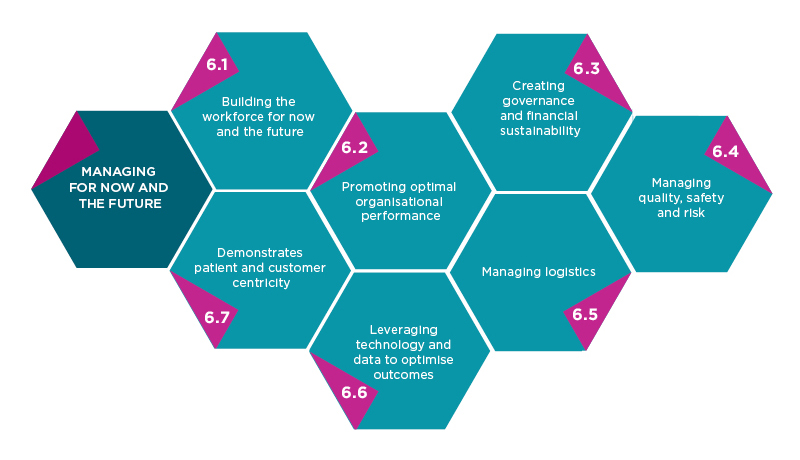Domain 6: Managing for Now and the Future

This domain focuses on ensuring what is done today works for tomorrow.
A key management capability for the future is less about being in control and more about participating and influencing the formation of sense making and meaning. It is about creating a context that enables connectedness, interaction and building trust.
Competent managers are essential to the productivity of organisations and the sustainability of the NSW health care system. Management-oriented capabilities are typically more explicit, relatively concrete, task-related phenomena as compared to leadership capabilities.
Capabilities and Behavioural Descriptors
6.1 Building the workforce for now and the future
- 6.1.1 Effectively manages people management processes including recruitment and selection, learning and development, performance management, remuneration and retention as required
- 6.1.2 Fosters a positive and productive workplace culture which promotes employee engagement, safety and wellbeing aligned to NSW Health core values
- 6.1.3 Manages change, fosters innovation and drives continuous improvement
- 6.1.4 Increases the focus of diversity and inclusion in the workforce
6.2 Promoting optimal organisational performance
- 6.2.1 Demonstrates a knowledge of relevant business practices
- 6.2.2 Achieves optimal performance by planning, implementing, monitoring and evaluating human and physical resources effectively and efficiently
- 6.2.3 Gathers information from relevant and diverse sources to make sound business decisions aligned to NSW Health strategic priorities
6.3 Creating governance and financial sustainability
- 6.3.1 Correctly interprets financial management principles, with a focus on continually developing commercial, economic and financial acumen
- 6.3.2 Plans, organises, implements and monitors financial resources to safeguard effective quality and cost controls and drive optimal health outcomes in the short and long-term
- 6.3.3 Demonstrates appropriate financial stewardship through the ethical, honest and responsible use of financial resources
- 6.3.4 Demonstrates a heightened awareness of the impact and consequences of financial decision making, and ensures appropriate governance mechanisms and processes are in place
6.4 Managing quality, safety and risk
- 6.4.1 Uses evidence-based risk management principles, and facilitates the effective implementation of risk management processes and procedures
- 6.4.2 Communicates the importance of risk management and effectively embeds risk management practices into operational processes
- 6.4.3 Influences the behaviours of others to ensure quality and safety objectives and standards are met
6.5 Managing logistics
- 6.5.1 Makes logistical decisions which appropriately reflect the degree of interconnection and interdependence between people, processes, policies and procedures and the system
- 6.5.2 Effectively identifies and evaluates risk when managing logistics and takes appropriate actions to mitigate risk
- 6.5.3 Adapts to anticipated/unanticipated logistical changes in a timely manner
6.6 Leveraging technology and data to optimise outcomes
- 6.6.1 Leverages appropriate technology and data to enable achievement of outcomes
- 6.6.2 Correctly interprets and evaluates data to support evidence-based decision making in both current and future planning
- 6.6.3 Communicates key insights derived from data accurately and effectively
- 6.6.4 Promotes a culture which is compliant with the records, information and knowledge management requirements and policies of NSW Health
6.7 Demonstrates patient and customer centricity
- 6.7.1 Models work practices that focus on patient and customer centricity
- 6.7.2 Understands and communicates how workplace culture directly impacts on patient care, regardless of the work context (clinical or non-clinical)
- 6.7.3 Considers the expectations of patients, families, carers and other customers in all aspects of work
- 6.7.4 Consistently adopts an interprofessional approach with patients, families, carers and/or other professionals with an aim to achieve the best possible outcomes

